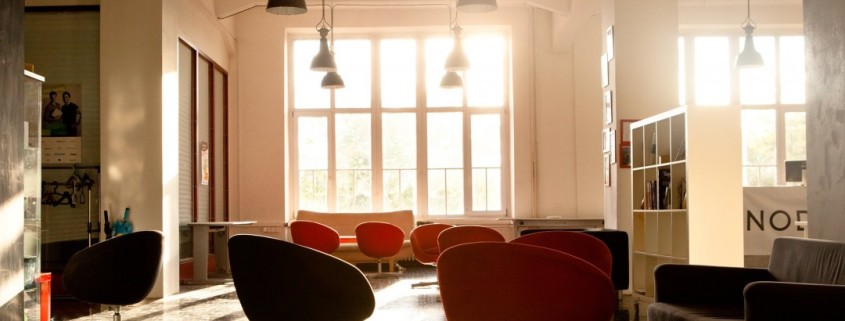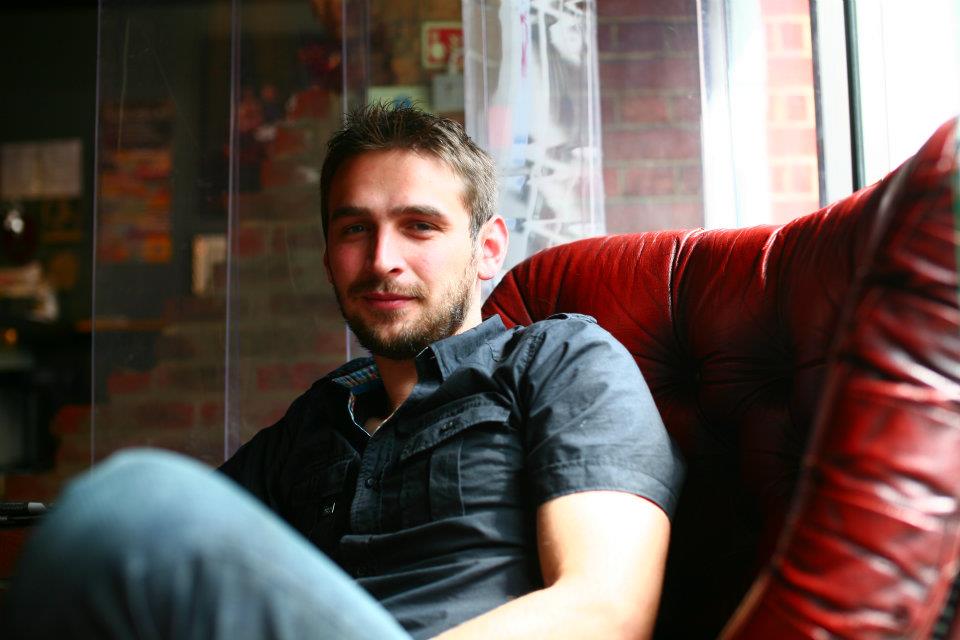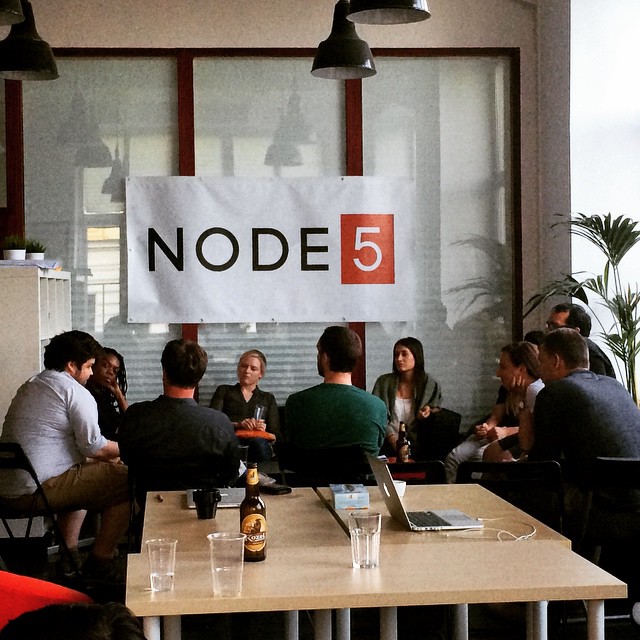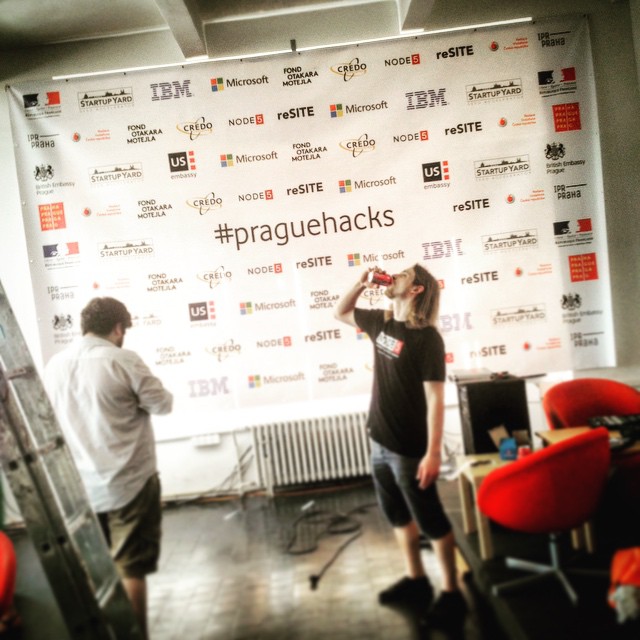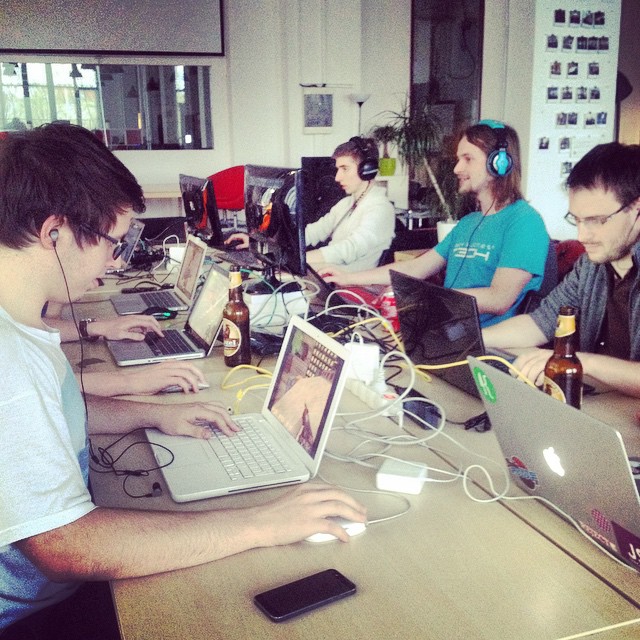Co-working: the Future of Work? Our Interview with Prague’s Node5
StartupYard’s connection with Node5 dates back to the founding of both, in 2011. Born as an incubator/accelerator program, Node5 and StartupYard quickly split into two separate programs, with separate investors.
Node5, founded by Lukas Hudecek (an original co-founder of StartupYard) became an open co-working space, with a mix of public and private offices which companies and freelancers, as well as startups, share. The space offers a dynamic and social workplace for people who would otherwise be working in small teams without large offices, and is a cost-efficient solution for small companies who would like to offset and share some of the costs of running an office, including reception, food and drinks, meeting spaces, security, cleaning, and other services.
Last year, StartupYard returned to Node5, launching a new partnership, and making some of the accelerator’s resources available to members of the Node5 community.
Node5 is conveniently located near Andel, in Smichov, part of Prague’s “Silicon Valley” district to the west of the city center.
You can read about Node5 on their website, or tweet to them @TheNode5
Hi Petra and Lucas! First, give me some background on yourselves. How did you come to work together?
Petra: I’ve stood on my own feet since the age of 13 and the rough struggle of everyday survival made quite an “iron lady” out of me. I learnt to go and achieve anything in any profession, and make money for the next day under any circumstances. This heartless method helped me quite a bit when I decided to set aside my university studies and enter the tough world of PR, marketing and sales in which I founded a company, later sold it and used the money to move to Amsterdam to finally pursue further self-development.
Time spent in Holland was quite therapeutic, and an eye opener. I created a local business- a leisure programme for hard working women which kept me financially independent. But more importantly, it taught me to love and respect myself as I grew alongside my business.
I met Lukas through a friend of mine while still living in Amsterdam. Meeting a businessman who cares more about helping others than making money was in my world just as much Sci-Fi as flying a rocket to Mars to shop at a Bio market. We had a couple of discussions and after a while it turned out we complemented each other in many ways. Particularly in business matters.
We found each other pitching in where the other got stuck. His philanthropy and my rigid attitude proved to balance out perfectly and after just a couple of months, real results showed and it’s kept rolling ever since. We make money and do good at the same time.
Lukas: Being thrown into world of entrepreneurship since the early stages of life, I had my ups and downs starting a couple of companies.
I started a computer hardware store and B2B platform for local computer shops, a creative agency making websites in FrontPage 97, a hardware manufacturer of heavy-duty wifi routers for rural areas and finally, a retail shop for home automatization systems. I raised capital for future endeavors by employing myself in companies as a developer, one of which happened to be Skype.
After a while I thought it would be great to share my experiences with others, and so I started to support younger entrepreneurs by organizing events and hackathons. Those efforts turned into founding StartupYard, where I had the amazing chance as CEO to put our first batch of eight companies through the 3 month program. I founded Node5 soon after.
The two most significant events in the existence of Node5 were when we became break-even in February 2014, and when I decided to hire Petra and make her my General Manager. She proved yourself ever since, and as an extra bonus I’ve gotten a couple of lessons on how not shoot myself in a foot.
What problem did you originally hope to solve by opening Node5?
Lukas: When I was with StartupYard, companies were missing two things especially. A venue and community. Node5 was exactly this, just without the acceleration program. When we started, we thought using London’s TechHub franchise was the way to go, but later we decided to stay independent. It looked like a crazy decision back then, but worth it because now we have the venue, community and accelerator under one roof with complete independence.
This is simply something neither Node5 nor StartupYard would have been able to achieve on it’s own at this scale. And that infrastructure was something I’d originally been hoping to solve for companies like we use to be in the beginning. The time is now.
Was there a model that you followed when you founded Node5? How have the space and business diverged from your original vision?
Lukas: As we were in close talks with TechHub during the early stages of Node5, we knew some of the essentials. We knew some basics about community and real estate business around this type of work. Even though the purchasing power in London and Prague differ greatly, we saw an opportunity in combining community and real estate in a nearly non-profit business to engage talent in an equity-based program, to slingshot ready made entrepreneurs out to the world.
But I was thinking about Node5 from the wrong angle at that point. Very soon we realized we are unable to pay for Node5’s operations costs with equity, so we started looking for stronger monthly revenues. In Feb 2014 after a long hard 2 years, we became break-even strictly on the real estate and space rental business side.
At that point, we had something of an appetite to crank up the old acceleration program too, but then StartupYard fortuitously returned [StartupYard was located elsewhere from 2012 to 2014] and did a fantastic job on the last batch. I would say that this helped us to properly realize Node5’s original vision for the first time.
On the business side, what has proved to be the hardest part of running a co-working space? Has anything surprised you?
Petra: Running a co-working space of this size and form proved to be slightly schizophrenic, because you are internally dealing with different types of businesses and professions in a team of 3 – 8 people max. A thousand square meters require constant maintenance. We keep that space up and tidy 24/7. There’s always something going wrong, somewhere. You have to do not just your promotion but also promote your partners. You’re a salesperson, project manager, event coordinator and HR, all at the same time having only 24 hours in a day.
You have to deal with smaller unreliable service providers since we don’t reach wholesale quotes. Its hard to describe the hustle we arein when we have to find an alternative so our clients won’t spot the difference. Fair usage policy is NEVER fair enough. You always step on someone’s toes and your good intentions usually interest no one.
Sometimes we help enthusiasts to throw their own gig to support their community, while planning events 6 months ahead in the background just to try hold still on a tight schedule. We have this policy to do our best and always walk the extra mile for our clients. But we can’t fit it all in all the time, and there’s always something we miss. It can be pretty frustrating!
Lukas: I’ve been surprised by the diversity of core tasks that are essential to running a coworking space. On a daily basis, we bounce between being a catering firm, an event production company, and real estate and business consultancy agencies. Each of these functions require a great deal of brain cycles on its own, so it’s hard to keep them profitable and running.
It’s like running four companies simultaneously, and that is really the hardest part. I wouldn’t be able to handle it without the great team Petra has put together. Running a coworking space isn’t exactly the easiest job ever, but what is?
Are there some success stories from Node5 that you’re particularly proud of?
Lukas: I think that I am speaking for my whole crew when I say that there are many successes our members achieved over the time we’ve been here, but I’d rather spotlight something else I am proud of. That’s the current state of our startup infrastructure and its ambitions. I am proud of all those 2-4 year old companies that still push forward like crazy! I am amazed how many failures were forgotten over the past months and years. I am sure that if there is anything like the Czech Startup community, it has never been better. I am proud of what we have achieved together over these last couple of years.
Do you see this or other alternative work spaces as a viable path for a larger part of the workforce in the future? If so, what are its main advantages and disadvantages?
Petra: Well as a former freelancer I’ve tried it all. I worked in a co-working space back in my early days, and I didn’t find it that awesome. But it was still better than being at home, where I either worked too much or not at all. Efficiency was quite arguable.
When I founded a PR agency with 10 employees, renting A-class office space in the city center, it was great at first. But every time we got stuck on something we had no one to turn our heads to. No doors to knock on. If there had been something like co-working for marketing agencies back in the days, I’d probably let the nice office go at least in a first 1-2 years of our life. Having like-minded people around means having opponents for your ideas all the time. It’s resources you could often use when you’re short handed or worse, when you have too many people. Just a simple coffee at the bar could save you hours of work. I see Node5 members get together everyday and I see them creating things, companies and values, helping and supporting each other. I find it simply priceless.
Lukas: There was a study by DeskWanted in 2013 saying that demand for shared workspace rises by 89% as the independent workforce hits 1 billion. There’s no current number of how many coworking spaces are there but back in the 2013 the number was 2.500 coworking spaces around the world. There are activities such as remoteyear.com showing us, that people like to work not just independently, but also remotely. The same signal we’re getting from big corporations who sends their small teams to work from Node5 remotely and independently from the rest of the company departments. Working in shared workspace isn’t for everybody, except it is 🙂
What’s in Node5’s plans for the next year or so?
Petra: We were working extra hard in the past four months on event production to earn some extra bucks that will allow us to refurbish our residential area, to provide much better working conditions for our residents and bring back a high level of comfort. Other than that, we are also working on a couple of business deals that will provide our members certain perks, that’s something we’ll be releasing soon so you have to wait for that!
Lukas: Recently, we faced a hard decision whether to expand to upper floors to ramp up our revenues, or improve the comfort in the current setup. We’ve chosen improvement and are currently undergoing reconstruction in the residential space. This will provide our members with more privacy for salespeople, more meeting rooms, leisure room, various options of privacy in coworking space and more.
Additionally, what we might be looking at from the longer-term perspective is a program for further support of companies after graduating from acceleration programs, and on growing the real-estate in size and level of quality, as well as range of provided services . We hope our team will help us to build it up for an interview next year.

